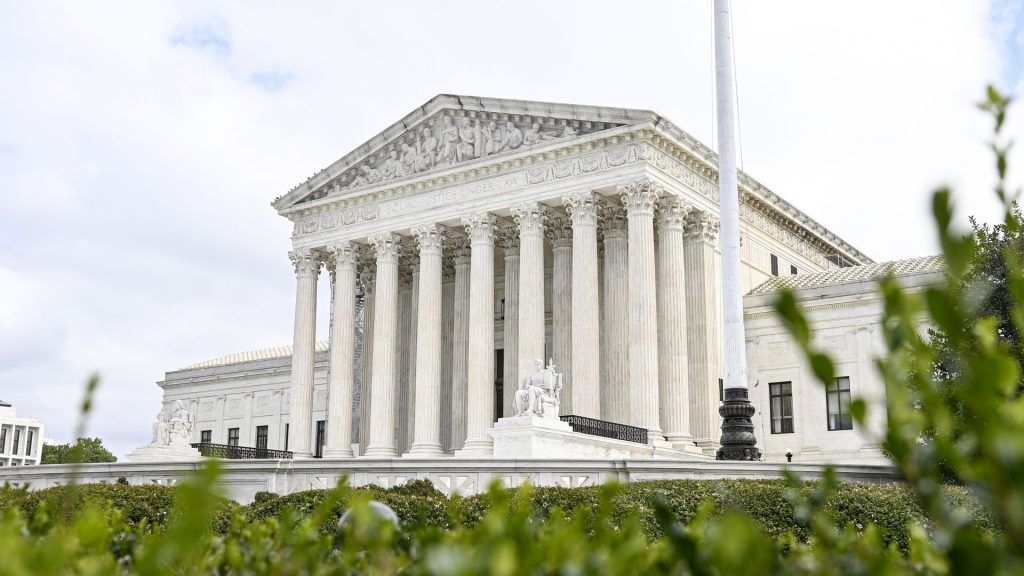Supreme Court gives Trump partial win in birthright citizenship case

The Supreme Court granted the Trump administration a stay, allowing it to partially implement the president’s executive order ending birthright citizenship. The 6-3 decision in Trump v. CASA is not on the executive order’s constitutionality, but rather a ruling on the use of an esoteric legal maneuver — nationwide injunctions.
Will Trump be allowed to deny birthright citizenship?
It’s not clear exactly what the Trump administration will be allowed to do. The Supreme Court instructed a district court to review the facts of the case and ensure its actions are not “broader than necessary to provide complete relief to each plaintiff with standing to sue.” The court also said the order cannot go into effect at all for 30 days.
There are 22 states, two immigrant rights groups and seven individuals who are parties to the lawsuit, and therefore could still be covered by a more tailored injunction.
The justices also clarified that a decision on the order’s constitutionality will come through the standard court process.
What’s an injunction?
An injunction is a court order that compels defendants either to require or prohibit a specific action, giving the plaintiff relief while the case makes its way through the system for a final decision. A nationwide injunction applies to everyone in the country, even those who are not part of the lawsuit.
What does the majority opinion say?
The majority opinion, written by Justice Amy Coney Barrett, states, “Universal injunctions likely exceed the equitable authority that Congress has given to federal courts. The Court grants the Government’s applications for a partial stay of the injunctions entered below, but only to the extent that the injunctions are broader than necessary to provide complete relief to each plaintiff with standing to sue.”
“When a court concludes that the Executive Branch has acted unlawfully, the answer is not for the court to exceed its power, too,” Barrett added.
What does Trump’s executive order say?
The case challenges President Donald Trump’s Jan. 20 executive order instructing federal agencies not to issue U.S. citizenship documents to babies whose parents are in the country unlawfully, or are in the country lawfully but on a temporary basis.
Multiple organizations and states sued, arguing the order violates the 14th Amendment’s citizenship clause, which states, “All persons born or naturalized in the United States, and subject to the jurisdiction thereof, are citizens of the United States and of the State wherein they reside.”
What did the minority say in the dissent?
In her dissent, Justice Sonia Sotomayor said Trump’s executive order is unconstitutional and therefore should not be allowed to be implemented in any way.
“The Government does not ask for complete stays of the injunctions, as it ordinarily does before this Court. Why? The answer is obvious: To get such relief, the Government would have to show that the Order is likely constitutional, an impossible task in light of the Constitution’s text, history, this Court’s precedents, federal law, and Executive Branch practice,” Sotomayor wrote.
“Every court to evaluate the Order has deemed it patently unconstitutional and, for that reason, has enjoined the Federal Government from enforcing it. Undeterred, the Government now asks this Court to grant emergency relief, insisting it will suffer irreparable harm unless it can deprive at least some children born in the United States of citizenship,” Sotomayor continued.
In three cases, district courts imposed nationwide injunctions, barring the federal government from enforcing the order. Now the justices decided the courts erred.
More on injunctions
Injunctions come in three forms:
- A temporary restraining order, which blocks an action while the court makes decisions about the future of the case
- Preliminary injunctions, which stay in place while the case works its way through the court system for a final decision
- Permanent injunctions, which are put in place if and when the law or regulation in question is ruled unconstitutional
Judges are supposed to use a four-part test when determining whether an injunction is appropriate:
- The plaintiff is likely to succeed and ultimately win the case
- The plaintiff is likely to suffer irreparable harm without relief
- The “balance of equities” is in the plaintiff’s favor
- An injunction is in the public interest





